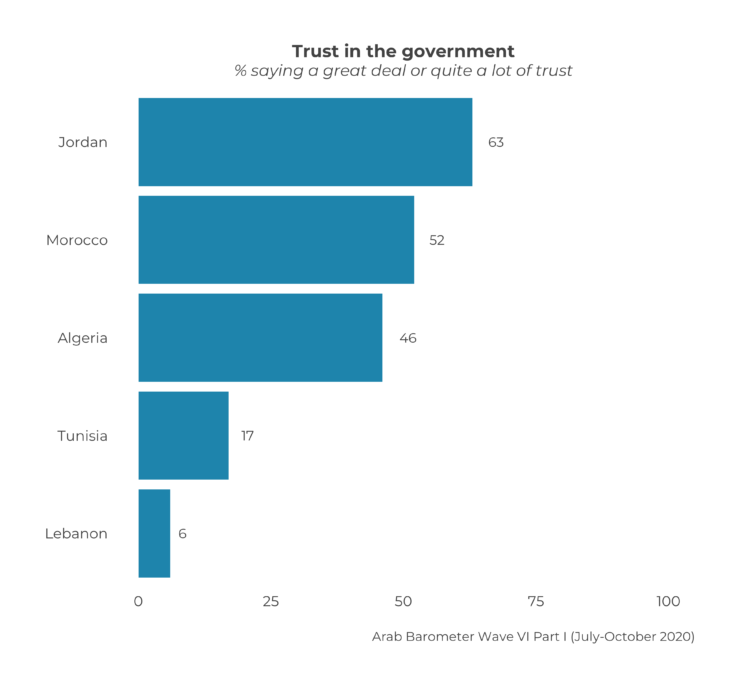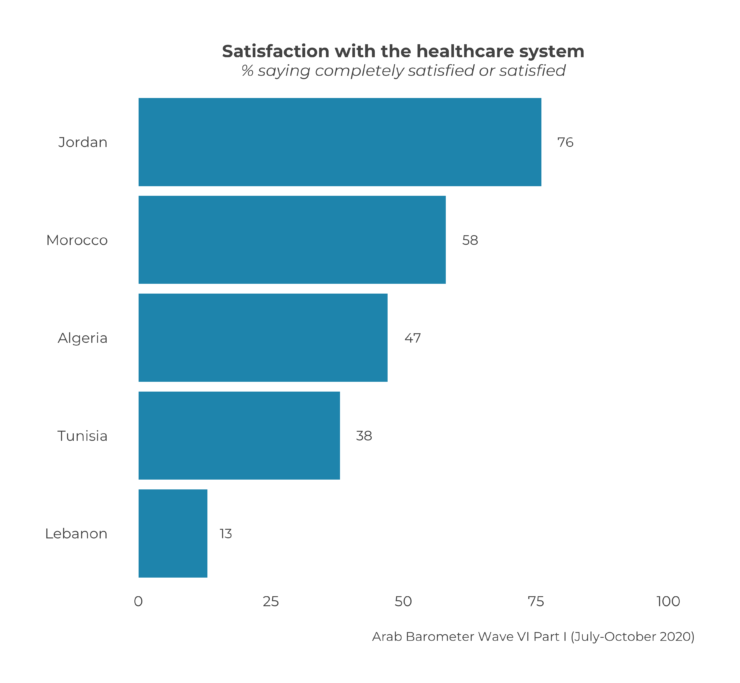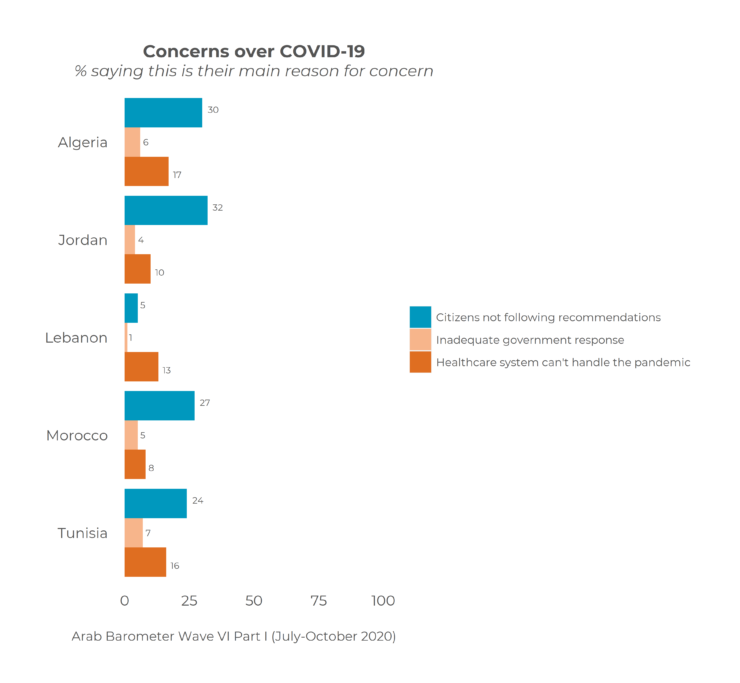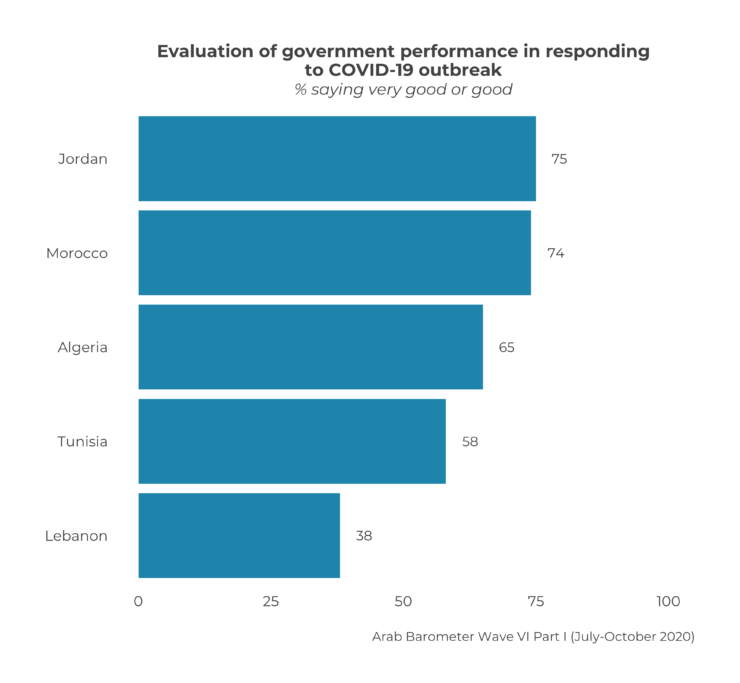The COVID-19 pandemic hit Arab governments in a difficult time when most were already under pressure. Economic crises and armed conflicts in some countries, like Libya and Syria, have had spill-over effects that continue to be felt across the region. Governments’ failure to address these challenges over the years had shaken the public’s trust in their rulers. The Arab Barometer’s Wave VI Part I surveys, conducted by phone in select countries during the months of July through October, suggest that levels of trust in government vary widely, ranging from 63 percent in Jordan to only 6 percent in Lebanon.

The COVID-19 pandemic presents a new, more complex challenge to both the economies and the healthcare systems of Arab countries. On the one hand, few Arab publics would expect a strong government response, especially given the relative weakness of their healthcare systems compared with developed countries where COVID has often overwhelmed their systems. However, despite these challenges, the 2020 Arab Barometer surveys show variation across the region in satisfaction with their healthcare systems. In Jordan, three-in-four say they are satisfied with the healthcare system while in Morocco a majority (58%) are satisfied. Elsewhere, fewer than half say the same, including 47 percent in Algeria. Meanwhile, levels of satisfaction are low in Tunisia with 38 percent and even lower in Lebanon with only 13 percent of people expressing satisfaction. Likely, these ratings reflect, at least in part, relative expectations across the region, meaning that citizens are not necessarily using the same criteria to make this evaluation.

On the other hand, COVID-19 forced the governments to take strong actions, offering an opportunity for a redemption of trust with the public. As COVID-19 began to spread in the spring of 2020, several Arab governments took decisive measures to limit the spread. Days after the first confirmed case was reported on March 3, Jordan closed its borders to pandemic countries and isolated administrative governorates from each other. Within weeks, the government closed its borders entirely, ordered a national curfew, and called for social distancing. The government rallied media outlets and community leaders to raise awareness about the dangers of the virus. Similarly, Morocco enacted the State of Emergency on March 20th, when the country had fewer than 80 cases in total. The government suspended all international and domestic travel and banned public gatherings.
Even in countries undergoing a political transition, like Tunisia and Algeria where new administrations got elected shortly before the pandemic, the government response followed a similar path. Once the first confirmed cases were recorded, the Tunisian government closed the borders, ordered a partial curfew, and shut down public spaces including mosques and schools. The government mobilized its military and police forces to ensure adherence to the rules. In Algeria, the government shut down all points of entry in mid-March and restricted domestic travel. It also imposed a curfew and required face coverings to be worn in public, imposing fines on those who fail to follow the rules.
Other countries, however, were less fortunate. Lebanon was one of the earliest countries to report COVID-19 cases in the region. Although the government issued curfews and suspended international travel, the weak and ineffective state relied mostly on citizens’ awareness, rather than government actions, to contain the spread of the virus. The August explosion at the port of Beirut worsened the situation for Lebanon as thousands have lost their homes, thus were forced to find new places to live, making it even harder to control the spread of the virus.
Arab governments’ efforts to combat and contain the outbreak of COVID-19 seem to be recognized and acknowledged by the public. When asked to explain their reason for concern over COVID-19, only a small percentage of citizens cited the government response being inadequate as the most concerning factor. The ineffectiveness of the healthcare system and citizens’ unwillingness to follow recommendations were causing more concern for people than the government response in all surveyed countries.

These strict measures taken by some governments contributed to their partial success in limiting the number of cases and deaths. By the first week of October, Jordan recorded a low case-fatality rate of 0.8 percent while Morocco’s rate was 1.7 percent and Tunisia’s rate was 1.5 percent. Algeria recorded a higher rate of 3.4 percent. Even though Lebanon’s recorded rate is 0.8 percent, the number is questionable given the difficulty of testing and tracing in the country. For the North African countries, the rates are low when compared to the rates of other Mediterranean states like France (4.1%) or Spain (3.7%). Jordan’s rate is also low compared to other Middle Eastern countries like Turkey (2.6%) and Egypt (5.8%).
Perhaps as a result, the Arab Barometer’s Wave VI Part I survey shows that the public views governments’ responses favorably overall. Three-fourths of Moroccans and 74 percent of Jordanians say that their governments’ performance in responding to the pandemic was very good or good. Although slightly lower, the percentages in Algeria (65%) and Tunisia (58%) are high enough to suggest that the public acknowledges the governments’ efforts to combat COVID-19. Meanwhile, just 38 percent of respondents rated the government response positively in Lebanon.

It is important to note, however, that these countries, following a global pattern, have witnessed a spike in COVID-19 infections since August. Given the recent developments, the positive attitudes toward government performance in response to the pandemic are likely to change.



